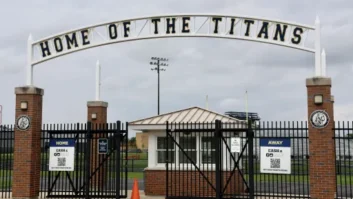LONDON — The BBC’s first home, from 1923 — now the Institute of Engineering and Technology — was the fitting location for the United Kingdom’s second annual Radio TechCon.

The audience at Radio TechCon 2017.
Credit: Vincent Lo

Global’s Matt Gray demonstrates Virtual Reality studio training.
Credit: Vincent Lo
Now a successful independent annual event, it brought together engineers from the BBC, commercial and community radio, with suppliers and those interested in the more technical aspects of broadcasting and audio production.
After starting with a look back at the history of radio engineering in the United Kingdom, the conference moved quickly to the future, and developments in 5G technology — with a mobile trial platform being deployed in Korea in time for the 2018 Pyeongchang Olympic Winter Games.
Speakers from the BBC’s research and development team, the European Broadcasting Union, and telecoms company BT/EE discussed how 5G would impact on broadcast content on mobile devices in the next five years, offering substantially enhanced mobile broadband — although coverage and the cost of data for consumers remain a challenge.

Chief Information Security Officer at Arqiva, Denis Onuoha speaks to the audience.
Credit: Vincent Lo

The BBC’s Dave Walters, assisted by Nigel Turner from transmission provider Arqiva, discusses the importance of using full use of full safety gear when working on a mast.
Credit: Vincent Lo
The U.K.’s largest commercial radio operator, Global, demonstrated its impressive use of virtual reality for studio training. The studio and equipment used by Capital FM in London have been recreated in VR, which can then be accessed using an Oculus Rift headset. This increases presenter engagement with routine training, and frees up physical studios.
Transmission provider Arqiva was well represented, with an important session from its Chief Information Security Officer, Denis Onuoha, on how to keep your station safe from cyber attack. His advice included using strong authentication, subscribing to software and hardware vendor vulnerability notifications, performing regular security testing, and using network segmentation with access control.
Later, Nigel Turner, Arqiva’s Principal Engineer for RF Safety, provided a strong visual demonstration of the requirements for working around radio frequencies, by dressing the BBC’s Dave Walters in the many and varied pieces of specialist equipment, protection and tools his field staff need to operate safely whilst working at height on a live broadcast mast.







